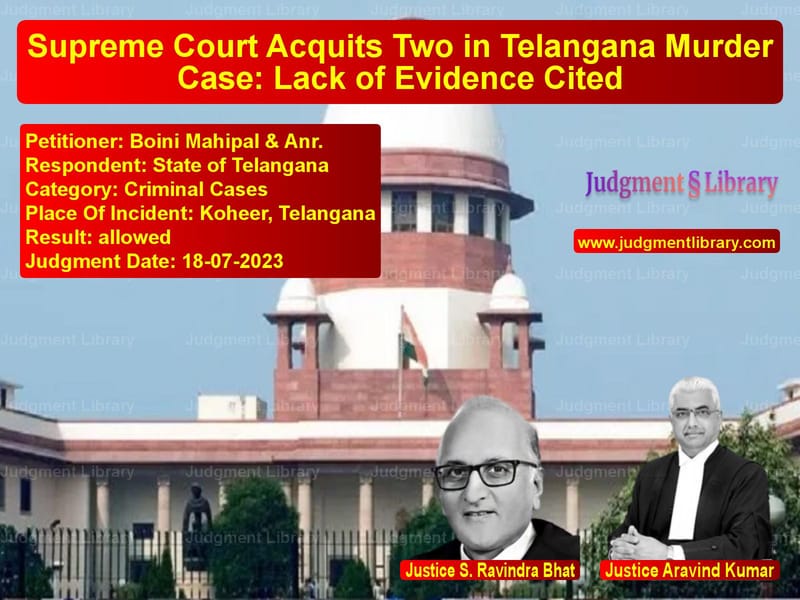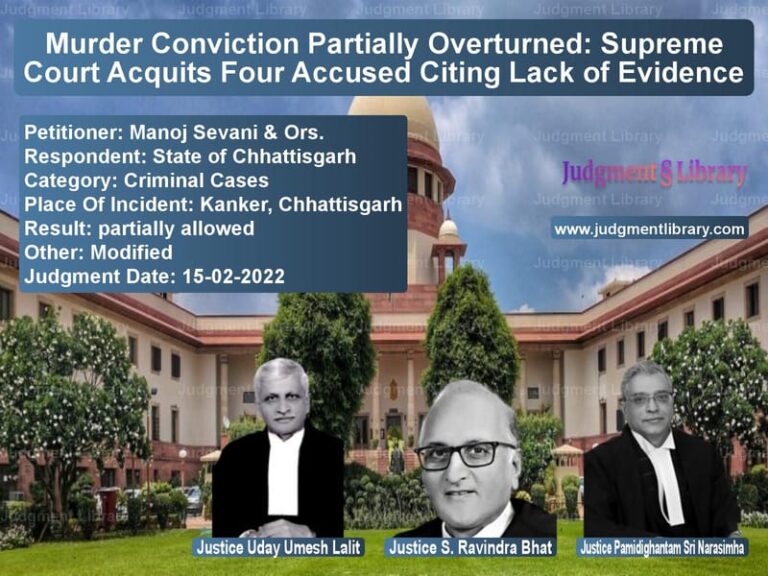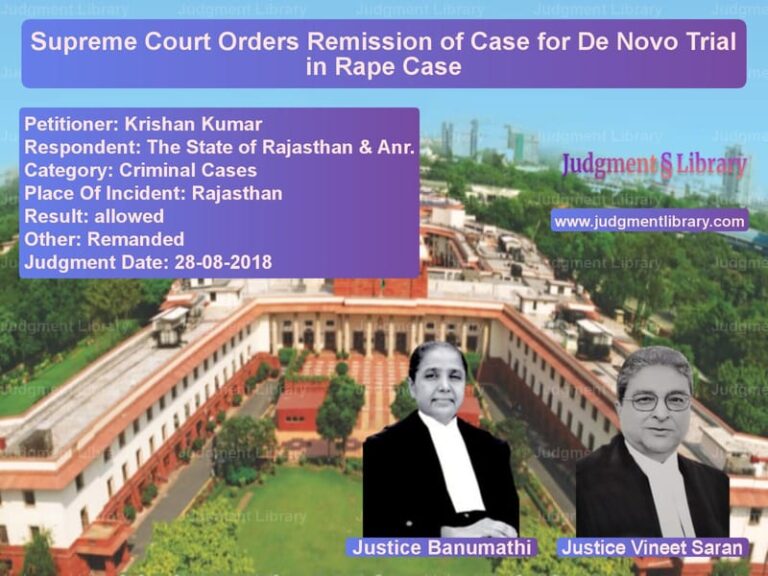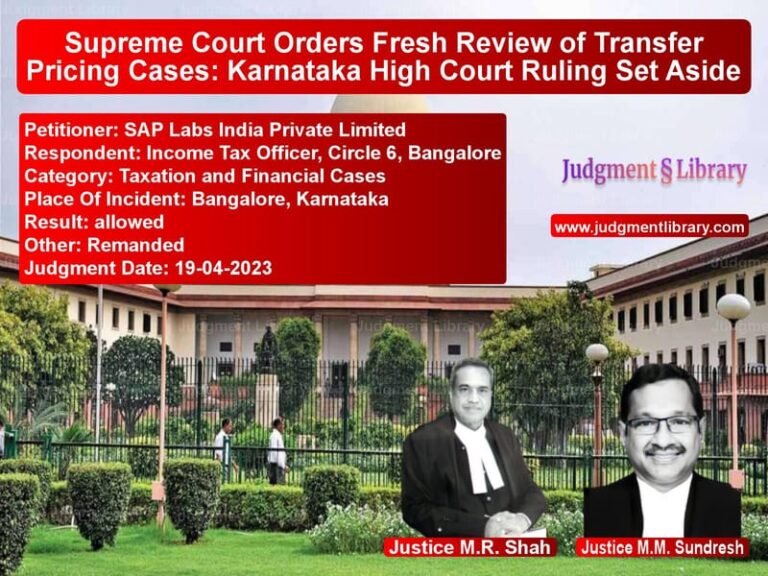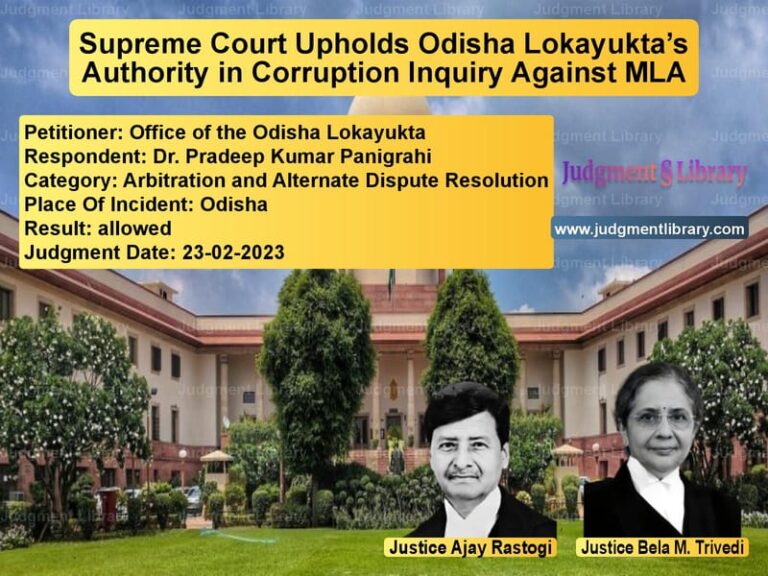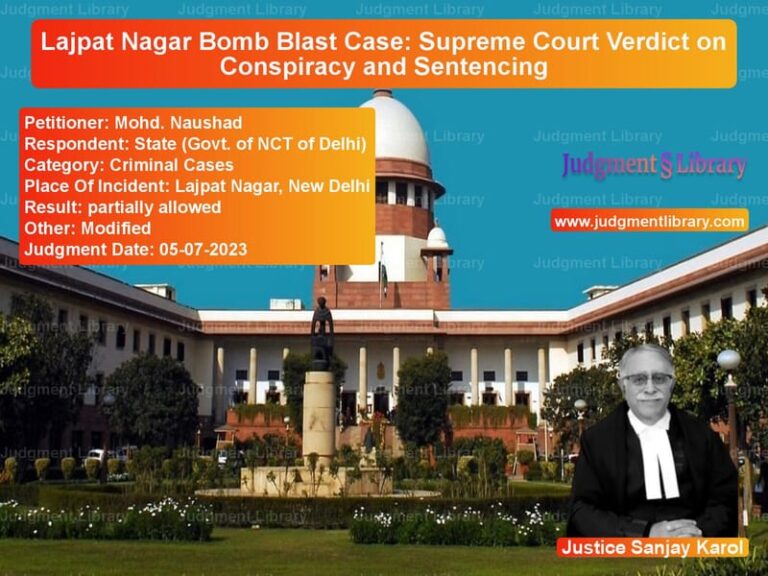Supreme Court Acquits Two in Telangana Murder Case: Lack of Evidence Cited
The case of Boini Mahipal & Anr. v. State of Telangana revolved around a tragic incident of alleged murder and assault. The Supreme Court acquitted the two appellants, citing a lack of concrete evidence against them. The ruling underscored the principle that conviction must be based on solid evidence beyond reasonable doubt, rather than vague or circumstantial claims.
Background of the Case
The case originated from an incident on April 8, 2012, in Koheer, Telangana, when a violent altercation allegedly led to the death of a woman named Anjamma. The police registered a case against six accused (A1 to A6), including the appellants (A3 and A4), under:
- Section 302 (Murder)
- Section 323 (Voluntarily causing hurt)
- Section 504 (Intentional insult with intent to provoke breach of peace)
- Section 34 (Acts done by several persons in furtherance of common intention) of the Indian Penal Code (IPC).
The deceased’s family alleged that A1 had kicked Anjamma in the stomach, which led to her eventual death on April 12, 2012, after unsuccessful medical treatment. The appellants (A3 and A4) were accused of participating in the assault.
Trial Court’s Verdict
The Sessions Court on November 15, 2012, acquitted all accused of murder but convicted them under Section 323 read with Section 34 IPC, sentencing them to:
- Six months of rigorous imprisonment
- A fine of Rs. 1,000 each
- Two months of additional simple imprisonment in case of default.
High Court’s Decision
On appeal, the Telangana High Court upheld the Sessions Court’s ruling on January 11, 2023, rejecting the appellants’ argument that there was no evidence linking them to the crime.
Arguments Before the Supreme Court
Appellants’ Arguments
The defense, led by Ms. Neha Singh and Ms. Prity Kumari, argued:
- The prosecution’s key witness, PW-5, admitted that A1 was the only one who kicked the deceased.
- No evidence directly linked A3 and A4 to the alleged assault.
- The prosecution failed to produce any medical reports to show injuries to other family members.
- Testimonies of PW-1 to PW-4 contained contradictions and failed to prove common intention under Section 34 IPC.
Respondent’s Arguments
The State of Telangana, represented by Shri Sriharsha Peechara and others, contended:
- The presence of the appellants at the crime scene suggested participation.
- The court should not disregard family witness testimonies.
- The Sessions Court and High Court had already ruled on the issue, and there was no need for further interference.
Supreme Court’s Findings
The bench, comprising Justices S. Ravindra Bhat and Aravind Kumar, examined the evidence and concluded that the conviction was based on insufficient proof.
Key Observations
1. No Clear Evidence Against the Appellants
“There was no cogent and positive evidence available to prove or establish the fact that appellants herein (A3 and A4) had assaulted the deceased.”
The Court found that none of the prosecution witnesses directly accused A3 and A4 of harming the deceased.
2. No Proof of Injuries to Other Family Members
“If PW-2 to PW-5 had sustained injuries, they should have received medical treatment and produced injury certificates, but no such evidence was presented.”
The lack of medical records raised doubts about the prosecution’s claim that multiple family members were assaulted.
3. Contradictory Testimonies of Witnesses
“Even though PWs 1 to 4 spoke of beatings, their testimonies were inconsistent and failed to provide a clear picture of the appellants’ role.”
The Court noted that vague statements without corroboration cannot justify conviction.
4. Section 34 IPC (Common Intention) Not Established
“The prosecution failed to prove that the appellants shared a common intention to commit the offense.”
The Court ruled that mere presence at the scene does not automatically imply involvement in a crime.
Final Verdict
The Supreme Court set aside the conviction and sentence, ruling:
“In the absence of any incriminating material or corroborative evidence pointing to the participation of the appellants, the conviction under Section 323 read with Section 34 IPC cannot be sustained.”
The Court ordered the immediate release of the appellants and discharged their bail bonds.
Impact of the Judgment
This ruling has several legal implications:
- Strengthens the burden of proof: Mere presence at a crime scene is insufficient for conviction under Section 34 IPC.
- Emphasizes medical evidence: Prosecution must produce medical records when alleging injuries.
- Prevents wrongful convictions: The judgment reinforces the principle of proving guilt beyond a reasonable doubt.
- Clarifies the scope of Section 34 IPC: Courts must establish common intention, not just group presence.
Conclusion
The Supreme Court’s decision in Boini Mahipal v. State of Telangana is a significant reaffirmation of criminal law principles. It ensures that individuals are not convicted based on weak, circumstantial evidence and emphasizes the importance of due process. This ruling strengthens the burden of proof on the prosecution and safeguards the rights of the accused.
Petitioner Name: Boini Mahipal & Anr..Respondent Name: State of Telangana.Judgment By: Justice S. Ravindra Bhat, Justice Aravind Kumar.Place Of Incident: Koheer, Telangana.Judgment Date: 18-07-2023.
Don’t miss out on the full details! Download the complete judgment in PDF format below and gain valuable insights instantly!
Download Judgment: boini-mahipal-&-anr.-vs-state-of-telangana-supreme-court-of-india-judgment-dated-18-07-2023.pdf
Directly Download Judgment: Directly download this Judgment
See all petitions in Murder Cases
See all petitions in Bail and Anticipatory Bail
See all petitions in Attempt to Murder Cases
See all petitions in Custodial Deaths and Police Misconduct
See all petitions in Judgment by S Ravindra Bhat
See all petitions in Judgment by Aravind Kumar
See all petitions in allowed
See all petitions in supreme court of India judgments July 2023
See all petitions in 2023 judgments
See all posts in Criminal Cases Category
See all allowed petitions in Criminal Cases Category
See all Dismissed petitions in Criminal Cases Category
See all partially allowed petitions in Criminal Cases Category

